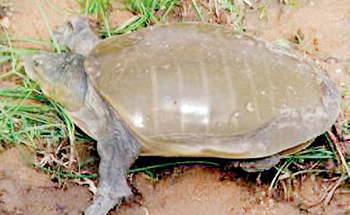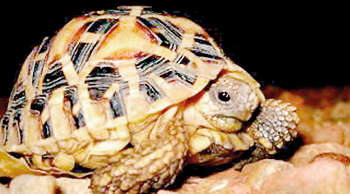News
Confiscated tortoises were ‘pets’, says Chinese restaurant owner
View(s):By Malaka Rodrigo
The 14 tortoises seized during a Police raid on a Chinese restaurant in Thimbirigasyaya, Colombo, have been handed over to the Dehiwala Zoological Gardens until the investigation is completed. The raid followed a complaint that cooked tortoise flesh was being served to diners.
 Shells of soft-shelled Terrapin: Considered a delicacy |
 Hard-shelled Black Terrapin - Gal Ibba (Melanochelys trijuga). Pic by Sameera Karunaratne |
 Soft-shelled Terrapin - Kiri Ibba (Lissemys ceylonensis) |
 Star Tortoise (Geochelone elegans) |
The restaurant owner, a Chinese national, was arrested and released on bail. He told the Police that the tortoises were being kept as pets. The tortoises were found in the vicinity of the restaurant kitchen.
Killing a tortoise or possessing tortoise flesh is an offence under the Fauna and Flora Ordinance of Sri Lanka.
The tortoises are Black Tortoises or Black Hard-Shelled Terrapins, also known as “gal ibba”in Sinhala, according to Sameera Suranjan Karunarathne of the Dehiwala Zoo-based Young Zoologists’ Association (YZA). The tortoises are also referred to as Black Turtle. The gal ibba can grow to more than one foot in length. Mr. Karunarathne said the seized tortoises were full-grown animals and could be up to 10 years old. Tortoises are famous for their longevity, a fact that is of little consequence to those who regard tortoise flesh as a culinary delicacy.
There are also two subspecies of the Black Tortoise, one being endemic to Sri Lanka, said Mr. Karunarathne, who is a reptile expert. The endemic subspecies is rare and found only in parts of the North Western Province. The 14 seized Black Tortoises included the endemic subspecies.
Animal welfare groups and the Police believe that tortoise flesh is in demand in Colombo and towns outside Colombo. They say the growing numbers of Chinese nationals visiting Sri Lanka for work and travel have given rise to an illegal trade in tortoise flesh.
Sri Lanka is home to three varieties of native tortoise. Besides the Black Tortoise, we have the Soft-shelled Terrapin and the Star Tortoise. The soft-shelled terrapin, known as “kiri ibba”, is also a targeted species.
The Star Tortoise, or “tharu ibba”, is popular as a pet. The tortoise is also a favourite among racketeers who smuggle animals out of the country. The Custom’s Biodiversity Protection Unit has thwarted several attempts to secretly export Star Tortoises.
Sri Lanka’s tortoises are doubly threatened, says animal lover and herpetologist Dr. Anslem de Silva.
They are threatened by greedy diners and profiteers, as well as by natural threats such as climate change. The mud holes that are natural tortoise habitats are drying out.
The Star Tortoise is a “near threatened” animal species, according to the National Red List.
Meanwhile, the Red-eared Terrapin, imported for aquariums, has started spreading in the country’s waterways. A native of North and South America, the Red-eared Terrapin is regarded here as an “invasive” species.
Follow @timesonlinelk
comments powered by Disqus















